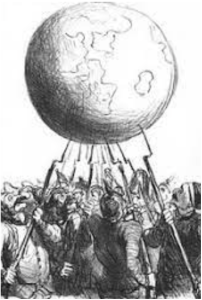Ques. The Emerging World Order is a Multiplex one. Discuss.
Answer
- According to Amitav Acharya, ‘multiplex world’ implies a world of multiple great and regional powers and other actors bound together in complex forms of interdependence. It can also be likened to a multiplex theatre in which one can see a variety of shows, directors and actors under one roof.
- Acharya argues in a multiplex world, while the U.S. continues as a major force in world affairs, it lacks the ability to shape world order only after its own interests and image. As a result, the U.S. will be one of a number of anchors including emerging powers, regional forces, and a concert of the old and new powers shaping a new world order.

- Note: Multipolarity is a distribution of power in which more than two nation-states have nearly equal amounts of military, cultural, and economic influence. With the disintegration of the Soviet Union and end of the Cold War, the world witnessed a brief unipolar Pax-Americana moment.
- However, the emergence of China, Japan, Germany, India, Russia, Brazil, South Africa, etc., as alternate power centres in different continents of the world, ‘multipolarity’, as a concept, received wider scholarly attention.
- According to Amitav Acharya, Multipolarity is the conventional way of describing a world order that is neither bi-polar nor unipolar. But it is an outdated concept and it refers back to a very particular (19th century Europe or pre-World War II) period in European history which is unlikely to repeat itself in the same way.
- One crucial difference between the multipolar world of the 19th Century and the multiplex world of the future is the huge growth of global interdependence as underlined by liberal interdependence scholars:
- While European interdependence in the 19th Century was mainly based on trade, it was undermined by competitive search for foreign colonies by the major European nations.
- Today’s global interdependence is both broader and deeper, covering not only trade, but also finance, production networks and global economic arrangements that did not exist then tying the global future together.
Click here to watch the video explanation of the above question.
Happy Learning!



